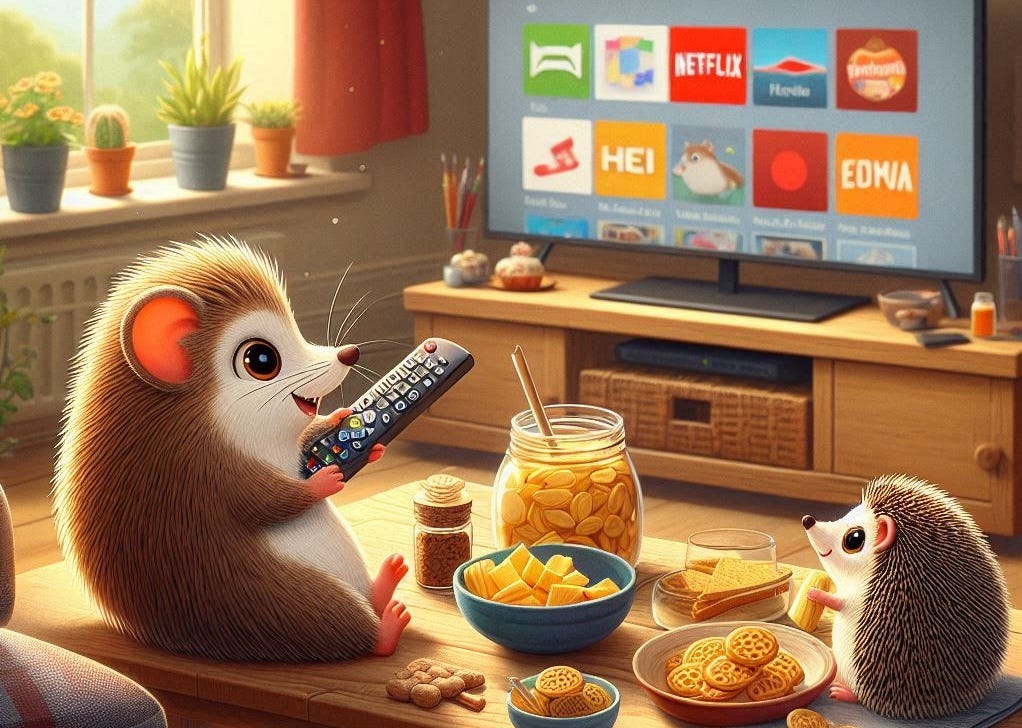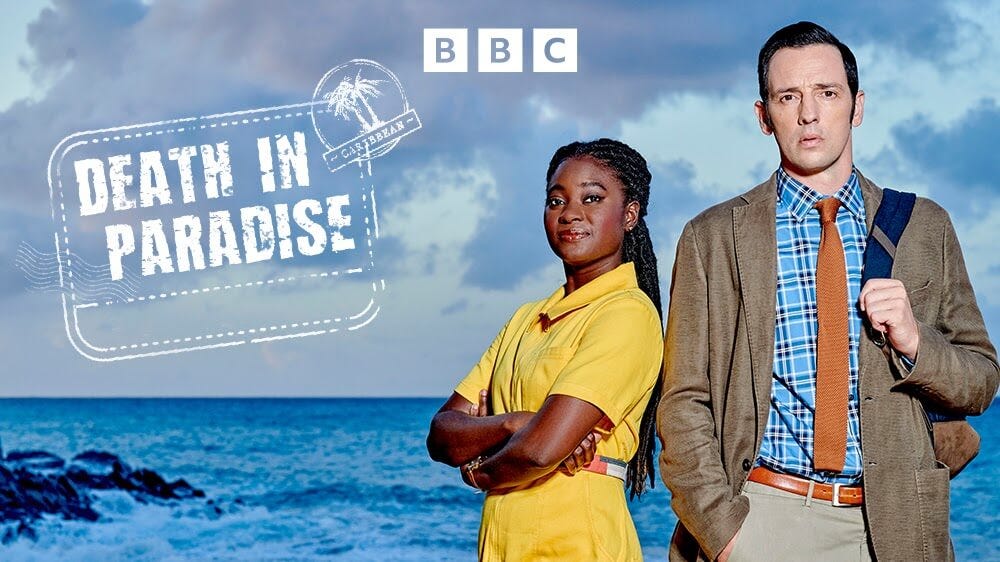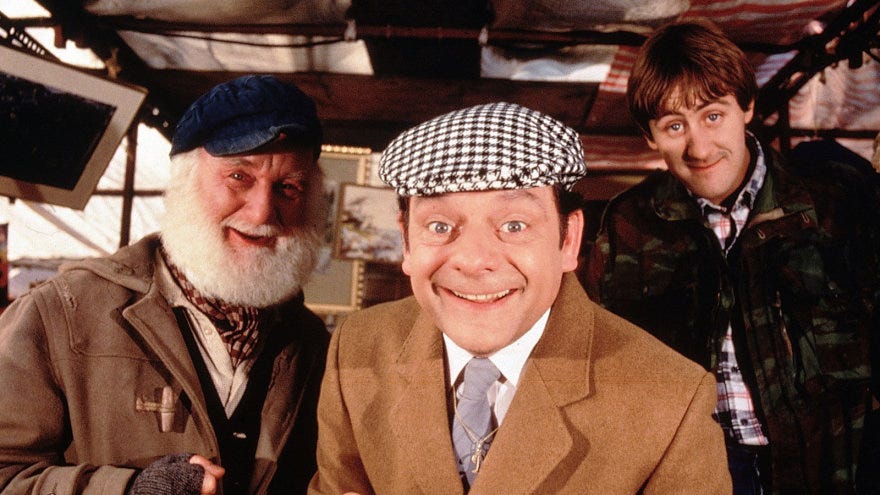You don’t see many hazel dormice these days. These tiny adorable creatures depend on hedgerows and ancient woodlands. As farming has become less profitable and fields enlarged, the population of these tiny rodents has decreased by 75% over the last 25 years. Hedgehogs, water voles and natterjack toads have all declined as the countryside has changed.
But what does this have to do with watching TV?
Endangered Sitcoms?
People are talking about sitcoms in terms of being an endangered species. I wrote about this a couple of weeks ago suggesting some reasons why sitcoms aren’t coming through as they used to.
But there is a bigger and wider picture to consider. The ecosystem has changed. The shape of the industry is wildly different from how it used to be. That was a system which made sitcoms as common as badgers are today.
I’m not suggesting that sitcoms should be protected by law, tempting – and self-interested – as that may be. But it’s all very frustrating. TV commissioners say they want mainstream laugh-out-loud sitcoms. Audiences want to watch them – and continue to watch studio sitcoms from the last fifty years (I just showed my teenage kids an episode of Porridge. Still funny). What’s changed to make sitcoms such a rarity?
Everything changes. We used to have three channels and no way of watching anything that wasn’t being broadcast there and then. Now we have multiple channels and streaming, so I could show my kids an episode of Porridge. What’s not to like?
But the changes have dramatically altered the fortunes of the lesser spotted sitcom.
ITV Regions
The ecosystem of TV in the 1970s and 1980s in the UK at least, turned out to be an excellent breeding ground for sitcoms. There was the BBC making comedy ‘in-house’ like Dad’s Army and Steptoe and Son. And there were various regional companies like Yorkshire TV who made Rising Damp, Home to Roost and The New Statesman or Granada who made The Lovers and Cuckoo Waltz.
Sitcoms have always been a highly risky business. Quite often, they just don’t work. But things don’t seem as risky when you have only three channels, and the audience will watch whatever’s on TV. Even changing the channel meant getting up off the sofa and so you have an atmosphere in which the audience is primed to give a sitcom a chance.
The Birth of the Production Company
Channel 4 started in 1982, leading to the rise of independent production companies, and a new sector emerged which was healthy competition for the in-house BBC Department. Hatrick emerged, making Chelmsford 123, Game On and Father Ted. Tiger Aspect gave us the Vicar of Dibley. Pozzitive gave us dinnerladies. Hartswood gave us Men Behaving Badly. I worked for Big Bear Films on My Hero, and DLT on My Family.
This looks like a very healthy ecosystem for sitcom. It was, although it was mostly a continuation of the 1970s.
But there was another change in the 1990s as ITV underwent another revolution as Carlton and Granada TV all stretched their muscles before being brought together in early 2000s as ITV plc. A vital sitcom-sustaining ecosystem was lost.
But one thing stayed the same: a TV channel paid full price for its content.
Paying Full Price
Let’s say you are Kickbox Productions, an independent TV company. You have a sitcom called Cornered about a husband and wife running a corner shop. You take it to BBC who like it and wants to buy it. Each episode will cost about £250k. Six episodes will be £250k x 6. That’s £1.5m. That’s quite a lot of money, isn’t it? Anyway, you make six episodes.
You hand over the big digibeta tapes and some paperwork. They pay you £1.5m. They broadcast them. And repeat them, because they went down well. But they only repeat them once.
And if you’re lucky, there’ll be a second series, more repeats and you go round again. You could put out a DVD of the first series. Then the second. Then a boxed set. It may be repeated again and again. Situation comedy was potentially very profitable.
With broadband internet, TV changed again. Now it is international.
Platforms
Our new ecosystem is based around platforms: BBC iPlayer, SKY/NOW/HBO, Netflix, Prime, Apple, UKTV and BritBox. Many of these platforms operate internationally and TV programmes – now called ‘content’ – are internationally financed.
These platforms have produced astonishing TV shows that might not have been possible before. I’m thinking of The Crown or Stranger Things that would make no financial sense under the old system.
But how does it look for your sitcom? And your production company, Kickbox?
You have a sitcom called Cornered about a plucky underdog couple running a corner shop, taking on the local supermarkets and home delivery services. Maybe they start their own delivery business. Whatever. You take it to a channel who like it, but they don’t want to give you £250k per episode for it. They’ll put in £100k. Can you get the rest from elsewhere? Who might get their money back when it streams on their platform? Will this get them subscribers? Will this make money? Without repeat fees and DVD sales? The model is now very different indeed.
Your British sitcom needs someone else to come on board. Will international TV financiers want to invest in a quintessentially British sitcom set in a corner shop? Probably not. Unless the wife who runs the corner shop is Adele? Can she act? Erm… Maybe? If someone’s putting the money in, they get to ask these questions. They want a return on their investment.
Because of the changes in TV, mainstream British sitcom just got a whole lot harder.
Everything Everywhere All at Once
The reality is that if Kickbox is a successful production company, you’re already one of several companies owned by an international media conglomerate. You’re in the same building as all those other companies. There’s very little incentive for you to develop your quintessential British mainstream comedy given you know that international money wants international content. Develop formats. Documentaries. Cop shows.
That’s all fine. I like documentaries and cops show. But let’s note some serious sitcom headwinds here, especially given that comedy usually thrives on specificity.
Do international media buyers want to put money into a sitcom set in a quintessentially British precinct? Maybe, if it’s a light-hearted cosy crime series set in middle England with a tried and tested whodunnit formula that audiences love. Now you’re talking.
And that’s what’s selling at the moment: murder mystery.
I watch plenty of murder mysteries, so as a viewer, I’m not complaining.
But it explains why I started out writing sitcoms (My Hero, My Family, Miranda, Citizen Khan) but have more recently found myself working on murder mysteries (Death in Paradise and Shakespeare and Hathaway). For the record, I’m happy to work on either! (Contact my agent…)
My first love will always be sitcoms. That’s why I became a writer. I was brought up in the 80s when sitcoms were still on all four TV channels. These are the shows we never tire off. We watch them again and again. We quote them. We GIF them. We show them to our kids. (And thanks to streaming, we can!)
But sitcoms are risky and expensive. And it’s no-one’s fault if no-one commissions them. Turns out Concorde wasn’t economically viable either.
I don’t know how we can fix the new ecosystem to bring back a much-loved, endangered species. That’s out of my hands. We can’t go back to the days of three channels and no remote controls.
All I can do is offer sitcom scripts that might be worth the investment. I have one or two of those. (Seriously. Contact my agent…)
The Mainstream Comedy Crisis?
Is mainstream comedy in crisis? That’s the question I keep hearing, and very rarely do I get a straight answer. This question was tackled by Broadcast Magazine who just ran an interesting round-table discussion on the subject. They were asking the people who really are the generals and field marshals of comedy including big name producers like Jimmy Mulv…







